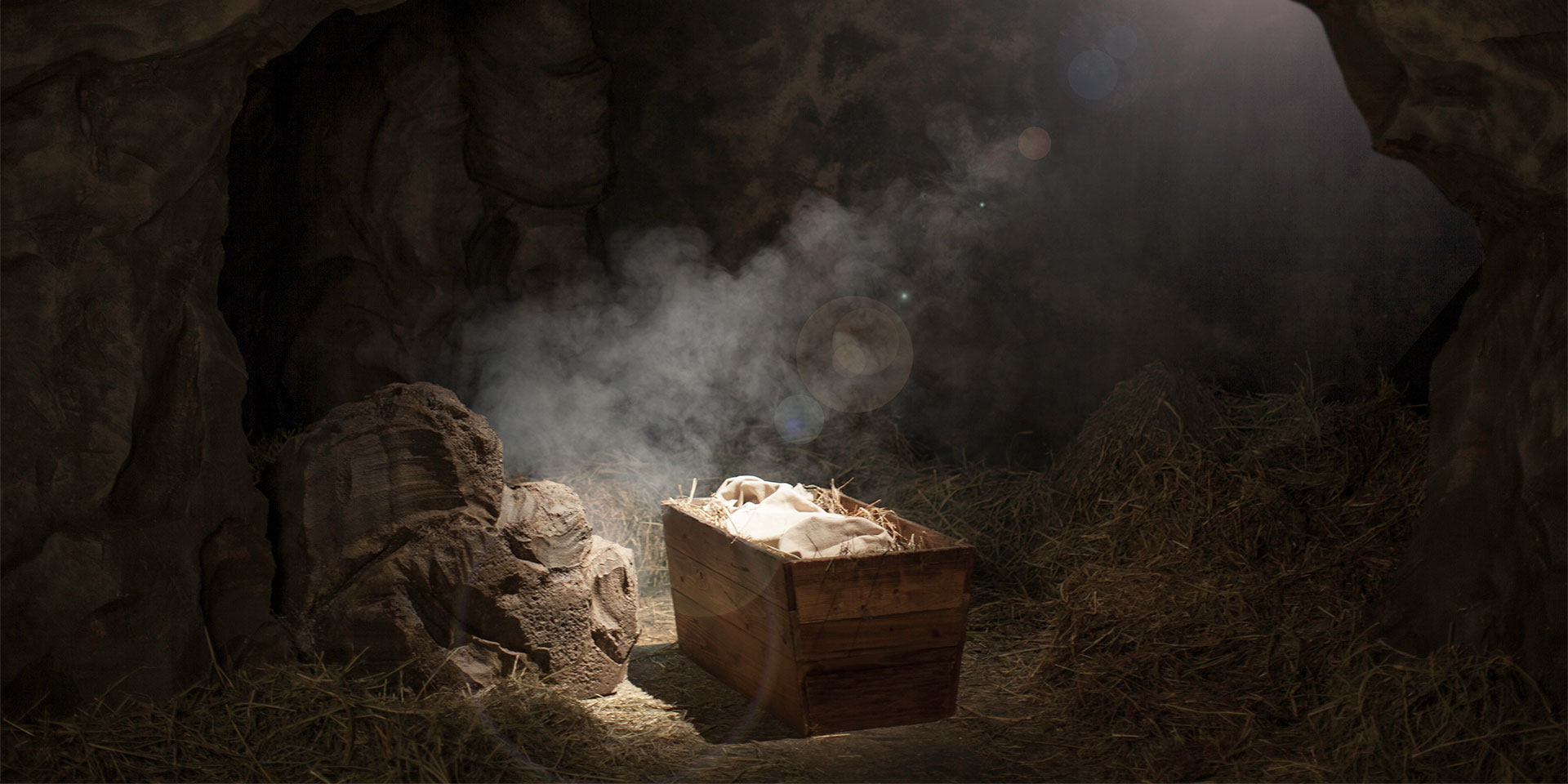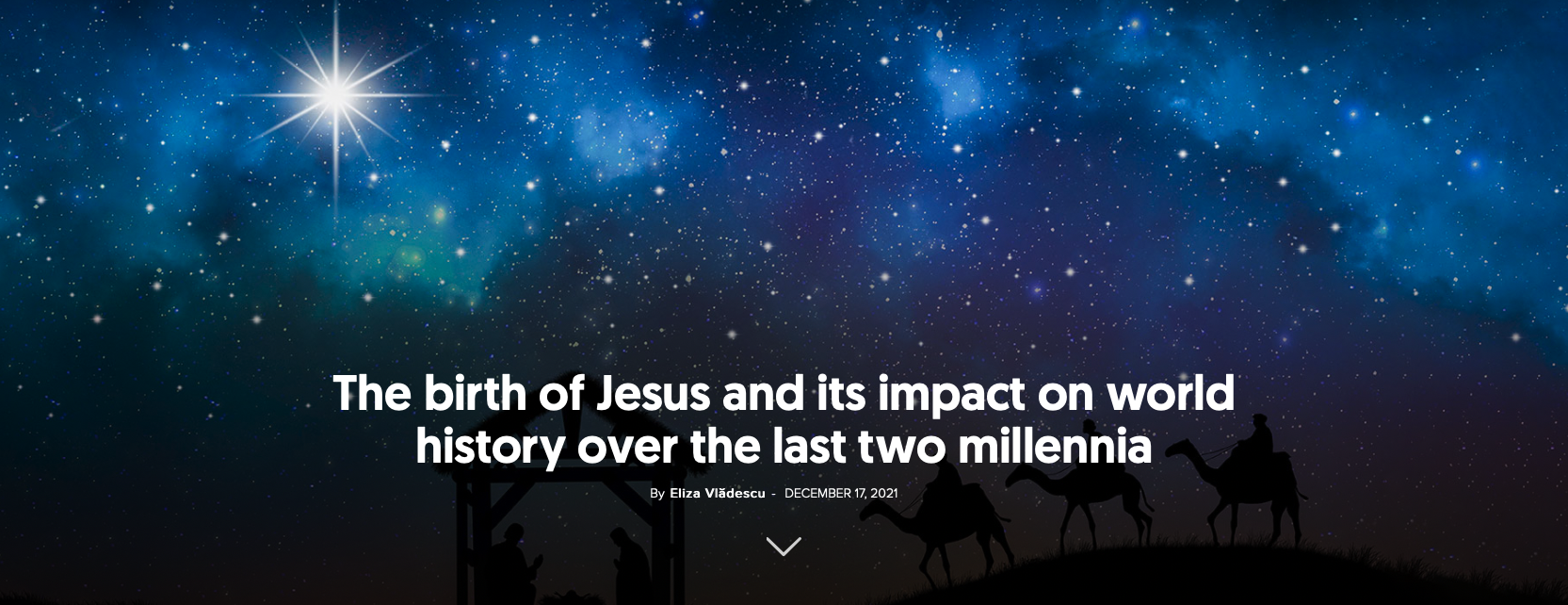“This will be a sign to you: You will find a baby wrapped in cloths and lying in a manger” (Luke 2:12).
“Christianity is the only major religion on earth to have as its central event the humiliation of its God,” writes the historian Bruce Shelley. A humiliation that He, the One who was contained in the body of a swaddled infant and lying in a manger, when even the heavens could not contain Him, chose to bear for us from the moment of His birth.
“He comes to sing His love at the door… He comes to cleanse my eyes of ashes.” You may be familiar with the words of this carol, which so well captures the distance between human and divine perspectives. After the loss of Eden, we are accustomed to seeing things through the flame of a “darkened conscience,”[1] but to see beyond the appearances of this world, we need the light that “shines in the darkness, and the darkness has not overcome it” (John 1:5).
Barefoot in the land of true greatness
Tainted by the principles and ideas of the culture in which we live, we often have a very distorted understanding of greatness. We expect God to do great things in our lives that will bring Him glory, but also a dash of glory for us, observes Christian author Ruth Chou Simons. And, as Simons points out, “it’s hard to be consumed with God’s glory when we’re busy trying to acquire our own.”
Pastor Garrett Kell compares mixed ministry to someone’s photobombing, which ruins the picture. After many churches and college campuses opened their doors to him to share his conversion story, Kell was very frustrated when he had to step back. For a time, he was asked to do menial tasks that literally kept him behind the scenes, and he realised that he yearned to serve God in a leading role, not in activities where he was invisible. “I wanted people to think God was awesome—and that I was, too,” the pastor writes, pointing out how easy it is to cross the line from genuine worship to idolatry.
“Whoever wants to become great among you must be your servant, and whoever wants to be first must be slave of all” (Mark 10:43-44). This teaching of Jesus’s to His disciples touches on the weakness that had caused discord and jealousy among them: the ambition to be superior to their brothers, a weakness that is so common in the human family. The quarrels that arose over the question of supremacy contrasted painfully with His spirit of sacrifice, but instead of rebuking them harshly, Jesus revealed to them the secret of true greatness: the humility that underlies service to others.
The gulf between our pride and His humility
If humility is the supreme virtue in Christianity, then the ultimate vice, from which all other evils spring, is pride, notes C.S. Lewis. And if it seems to us that the perniciousness of pride is being over-emphasised, the writer invites us to remember that it is through pride that “the devil became the devil.”
By its very nature, pride is competitive; it feeds on the pleasure of being better than another, which is why Lewis believes that a proud person does not and cannot know God as long as he or she remains stuck in this attitude. No matter how spiritual we pretend to be, we can only come into His presence with humility, and the proof that we are in fellowship with Him is that we are so captivated by His beauty that we forget ourselves, the author concludes.
There is no better antidote to the spirit of vain glory than the example of Jesus, notes Professor Georges Stéveny, commenting on the passage in which the Apostle Paul describes the Son of God’s self-emptying. The Apostle writes to the Philippians while he is imprisoned for preaching the Gospel, and his heart’s desire is for them to give up their spirit of rivalry, their quarrels, and their claims to superiority. Instead of exhortations that might prove sterile or do more harm than good, Paul chooses to put before the believers the model of Jesus, who “made himself nothing by taking the very nature of a servant, being made in human likeness. And being found in appearance as a man, he humbled himself by becoming obedient to death—even death on a cross!” (Philippians 2:7-8).
The comparison with a deposed king is far too weak to describe the sacrifice of the Son who took our chains to serve us, writes Stéveny. He came among us “incognito,” without His appearance forcing anyone to recognise His divinity. As the biblical scholar Alphonse Maillot observes, “He became so similar to humans that he was actually taken for a human being.”[2]
If His “emptiness” refers to His coming to earth and giving up the advantages of His condition, His humility refers to what happened after His incarnation, to His decision to obey, even at the cost of His life, Stéveny notes. “Having become human, He remained human to the end, until He came to the most desperate human situation. To the furthest extreme from the reign He enjoyed in heaven.”[3] Thus, from the God who does not intervene (as we sometimes perceive Him to be in moments of need), He became “the God who does not resist,”[4] and in this incomparable love we were able to see the emptiness of the unseen One, Stéveny points out.
However, people weren’t ready to see the greatness of a God who came down in the form of a servant. When He was born, no inn in the overcrowded Bethlehem of the time would accommodate Him, so a stable was all that was offered. To the people of His time, He was just a simple boy whose coming was welcomed or celebrated only by shepherds—an outcast category in a people proud of their privileges. The Incarnation was in itself an immense humiliation for the Father of Eternity, and the circumstances of His birth were so humble that many of His contemporaries were a universe away from the events taking place in their midst.
“Most people continued to live their life as if nothing had happened and nothing had changed,” writes the Rev. Robert W. Odom. And the reason they missed this unique event in world history was precisely because the simplicity and humility with which He had passed from “eternity into time”[5] had nothing in common with the glory in which they expected the Messiah to appear.
The humiliation that revealed Him as He is
The Jewish nation’s disinterest in the most wonderful news heaven ever brought to earth (“A Saviour has been born to you; he is the Messiah, the Lord”—Luke 2:11) was the result of vanity, selfishness, and blindness brought on by the pursuit of worldly interests, notes author Ellen White. Those to whom the prophecies of the Messiah’s birth had been entrusted were unwilling to receive Him except on their own terms. Therefore, when the time came for Him to be born in Bethlehem, the rulers missed the opportunity to carry the news of His birth far and wide. They even found themselves in the unenviable position of having to admit, on the occasion of the commotion caused in Jerusalem by the arrival of the Wise Men, that they were unaware of the event, which some pagans had learned about through diligent research.
The King of Glory came down among us without all outward splendour, for it was not an attribute with which He wished to draw souls to Himself. The beauty of His character was to be the only appeal, and the truth about Him was to be discovered only through scriptural evidence. That is why, “when the set time had fully come” (Galatians 4:4), He revealed Himself to the shepherds, to the Wise Men, to Simeon or to the prophetess Anna—those who longed to see the Messiah were allowed to share in the joy of the angels.[6]
We cannot enter into the joyful vibration of heaven if we seek fulfilment in earthly frequencies. The desire for greatness and the ambition to distinguish ourselves from others are paths that have been trodden but have never filled the soul. The Saviour’s promise is that those who seek Him shall never be hungry again—not even for glory. For their eyes, purified from the ashes of the earth, saw the glory of the God who revealed to us the truth about Himself in the only way we could understand: by becoming one of us.
Carmen Lăiu is an editor of Signs of the Times Romania and ST Network.




















